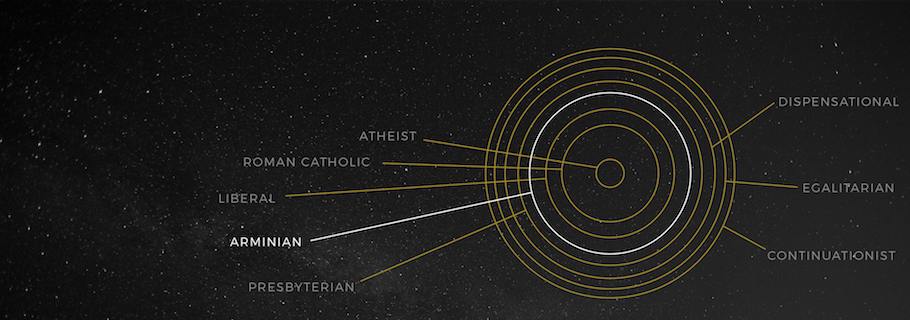Today I am continuing the series titled “Why I Am Not…” and in these articles I am telling what I do believe by looking at what I do not believe. So far I have told why I am not atheist, why I am not Roman Catholic, and why I am not liberal. Today I want to tell why I am not Arminian. (If you are uncertain of what I mean by Arminian, Theopedia has a brief but excellent article that explains its key tenets.) I was raised within the Reformed tradition, left it as a young adult, and returned to it a few years later. Let me explain how and why that happened.
For most of my childhood my family was involved in the Canadian Reformed Church. This denomination arose in the 1950s after a wave of post-war emigration from Holland. At the time we attended, their membership was still almost exclusively Dutch and we were among the very few exceptions. Nevertheless, we were warmly welcomed and for many years were comfortably part of those churches, first in Toronto and then in Ancaster.
The Canadian Reformed churches took as their foundation the Three Forms of Unity: The Heidelberg Catechism, the Belgic Confession, and the Canons of Dort. These documents were woven into the life and fabric of the church. Each Sunday evening the pastor preached a sermon based on the Heidelberg Catechism or one of the other documents. We learned Reformed doctrine and history in the denominational schools and even attended catechism classes on Tuesday evenings. Along the way I became thoroughly versed in Reformed doctrine.
As I grew into adulthood, though, I began to grow wary of it. For all the strengths of the Dutch Reformed churches, they showed little concern for evangelism and, not surprisingly, saw almost no conversions. I longed to be part of a church that was reaching the community around it and began to believe there was something within Reformed theology that was opposed to evangelism. After all, my primary experience of that theology was through this Dutch tradition. I began to listen to Christian radio and heard non-Reformed preachers like Charles Stanley who had a soul-stirring love for the lost. I began to listen to Christian music and heard songs that spoke to me, that fed me, even though they clearly came from an Arminian perspective. My horizons began to widen a little as I encountered Arminians who were preaching, singing, and celebrating truth.
Let me pause here for a brief aside. I need to affirm that somewhere between Roman Catholicism and Arminianism we have crossed an important line. The Roman Catholic church denies that salvation comes by grace alone through faith alone and, for that reason, teaches a false gospel. Arminians affirm that salvation comes by grace alone through faith alone and for that reason teach the true gospel. Even as I explain why I am not Arminian, I need to affirm that I am looking at a difference between brothers and sisters in Christ.
In 2000, now married and with a young child, I got a job in Oakville, Ontario, and Aileen and I moved to this new community. When we set out to find a church, we deliberately looked outside of the Reformed tradition, partly because of these concerns and partly for reasons I will recount when I tell why I am not paedobaptist. When we learned that a new Baptist church (Southern Baptist as it turned out) was beginning in our neighborhood we decided to visit on its launch day. We stayed for six formative years. To this point my Reformed theology was largely untested. I had not encountered the alternative in a compelling way. But now, at last, it would be challenged.
For a time we were thrilled with what we saw and experienced. We saw diversity, community, and conversions. It was an exciting and fulfilling time. But after a few years we found ourselves dealing with a growing sense of disquiet. Church leaders had asked me to read books by Rick Warren, Bill Hybels, and others like them and those books didn’t sit quite right. The pastor preached through Romans and did not have compelling explanations of certain key texts. The church began to prove that it was unhealthy and built upon a shaky theological foundation. I took my concerns to this relatively new platform called the internet and even began to explore my questions and concerns through a blog. Those old doctrines I had learned as a child and teen just wouldn’t let me go.
Then there was that momentous day when I wandered into a local Christian bookstore and selected two books that, by rights, had no reason to be there: Ashamed of the Gospel by John MacArthur and Whatever Happened to the Gospel of Grace? by James Montgomery Boice. The first book spoke to the structure and purpose of the church we attended and the second to its theology. I ordered Michael Horton’s Putting Amazing Back Into Grace, R.C. Sproul’s What Is Reformed Theology?, and James White’s Justification. And that was that. I realized that in leaving Reformed theology I had walked away not only from a theological system, but from truth. It was at this time that I discovered Grace Fellowship Church, a congregation that was both baptistic and Reformed. This church loved Reformed theology but also loved to reach the lost. As it happens, this pastor was also preaching through Romans and had deep, compelling explanations for those key texts. We soon withdrew from that other church—and from Arminian theology—on amicable terms. We have never looked back.
So why am I not Arminian?
I am not Arminian because Reformed theology is backed up by the Bible. When I honestly examined both Reformed and Arminian doctrine in light of the Bible, I saw evidence of Reformed theology everywhere I looked. Reformed theology depends not only on key verses but on the warp and woof of the entire Bible. It offers a far more compelling explanation of Scripture than Arminianism, both in its broad outlines and in its fine details. I do not see libertarian free will in the Bible. I do not see universal prevenient grace, unlimited atonement, resistible grace, or any of the other keys to Arminian doctrine. But I do see a God who is utterly sovereign, who has set his love on his people even in the depths of their total depravity, who draws them by irresistible grace, and who then holds them fast forever.
Evangelism and Reformed theology are not enemies, but the best of friends.
I am not Arminian because Reformed theology motivates evangelism. I came to see that my Dutch Reformed experience was not typical for Reformed theology and actually quite inconsistent with it. At its best, Reformed theology provides the greatest motivation to share the gospel locally and to the ends of the earth. It does this by assuring us of God’s sovereignty in both election and calling. Our task, then, is to take the gospel far and wide so that God can draw his people through his appointed means, the preaching of the gospel. Evangelism and Reformed theology are not enemies, but the best of friends.
I am not Arminian because Reformed theology creates the healthiest churches. We began to see that Reformed theology does not begin and end at the five points, but extends into the entire life and structure of the church. It provides the foundation to build healthy, multiplying local churches.
In short, I am not Arminian because I tried it and found it wanting, both in my experience and in my attempt to reconcile it with Scripture. I am not Arminian because Reformed theology is just too good to not be true.










